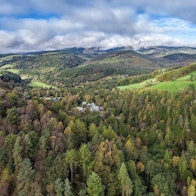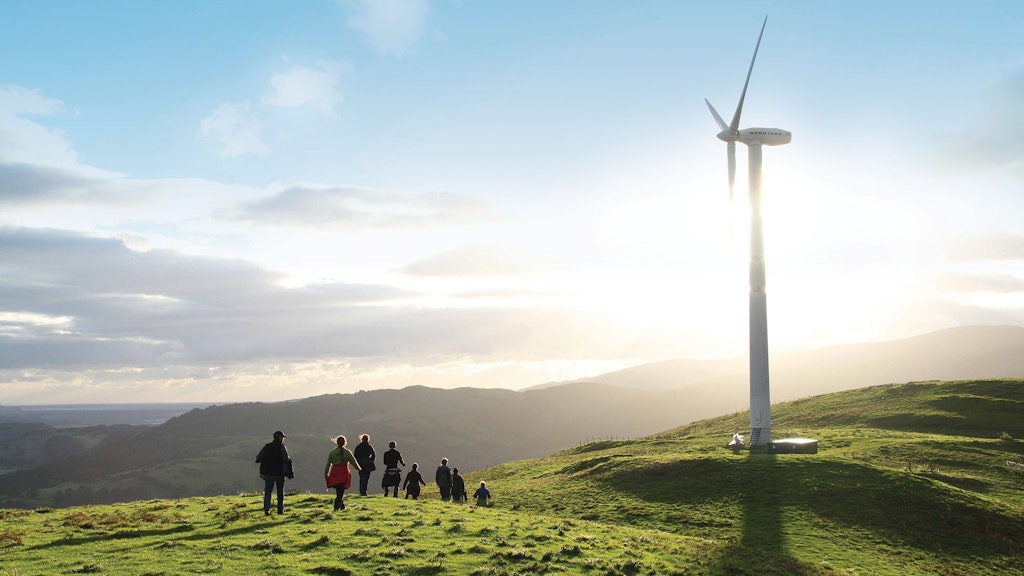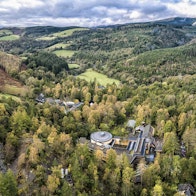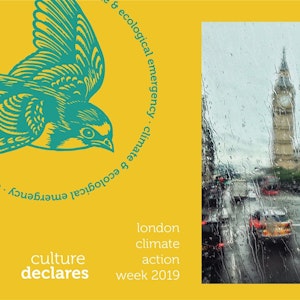
Culture Declares Emergency is a powerful emerging network of creative practitioners and organisations. Since its launch in April, around 450 individual artists, groups, networks and venues including the Royal Court, Battersea Arts Centre, Somerset House and Manchester’s Home have formally declared a climate emergency, and are working up creative responses.
As part of London Climate Action Week, on Monday 8th July Culture Declares Emergency invited CAT’s Zero Carbon Britain Project Coordinator Paul Allen along to talk about the Climate Emergency and Zero Carbon Britain as part of a wider exploration of the role of Arts and Culture in an Emergency Action Plan.
Paul Allen reports …
I was honoured be invited to share CAT’s Zero Carbon Britain (ZCB) research with a packed room of artists, writers, musicians, film-makers, and arts venue organisers in North London’s legendary Roundhouse. As the event opened, the Roundhouse formally signed up to Culture Declares Emergency.
I was part of a five-person team, including international lawyer Farhana Yamin, who were given the task of opening new conversations around the role of ‘culture’ in this climate and biodiversity emergency. In the first round, we each were given a four minute slot on “What is this climate emergency?”.
My focus was on the climate feedbacks that make things urgent, the systemic carbon ‘lock-in’ embedded in our society, and the lack of government and industry action on climate that has led to us being in an emergency situation.
We could have, and should have accelerated this shift decades ago – imagine if we had set a course for zero in the 1960s! We have, at last, acknowledged the science: the UK Government has now signed into law a new target to cut greenhouse gas emissions to net zero by 2050. But we know we must and can get there much faster.
Then after a break during which the Roundhouse was filled with the recorded voices of many bird species facing extinction, the panel reassembled to focus on the solutions.
Talking solutions
My slot focused on what I call ‘evidence-based optimism’. Many of the solutions included in our Zero Carbon Britain work are now seeing a rapid acceleration in the scale and speed of their deployment. Scaling up deployment leads to new research into manufacturing, which in turn leads to price drops. Price drops then lead to more scaling up, and so it goes on. The falls in cost of solar PV and wind have been faster than even the tech experts predicted!
The shift can also be accelerated by revealing the synergies between the investments needed to reach net zero and the co-benefits and cost-savings in improving health and wellbeing, enhancing biodiversity, creating jobs, reducing poverty, stabilising our economy, and increasing our resilience and ability to adapt to climate change. These ‘multi-solving’ opportunities also widen the scale and scope of communities engaged in the net zero transition.

But perhaps the most exciting development is the cultural shift that we are now seeing accelerating across the globe as schoolchildren, activists, councils and even parliaments demand urgent climate action.
Imagining a sustainable future
So, to conclude, I asked those in the room to imagine the world transformed. Close your eyes; it’s 2035 and we’re back at the Roundhouse. We are here to celebrate the opening of the final offshore turbine of the People’s Green New Deal. Most of the heavy lifting in carbon cutting was done by 2030, but today we crossed the finish line. So, what do we see as we look out through the Roundhouse café window at a Zero Carbon London in 2035?
Well actually, a lot of things look familiar, but there are some visible changes:
- All the buildings in the UK have been insulated to a very high standard.
- All new builds are now net negative carbon.
- Affordable public transport is run for the people, by the people and is electric.
- Cycling numbers have reached new levels, beating even Sustrans’ targets!
- All remaining cars are electric and powered by renewable electricity.
- Everything from toasters to phones is designed to last and can easily be repaired.
- Air flight holidays are now ‘simply embarrassing’.
- Thousands of new types of nature/wellbeing adventure holiday offerings have emerged across the UK, allowing us to reconnect with nature.
- Obesity levels have dropped – we eat much less meat and cheese, and what we do eat is locally produced.
- The number of vegans is beyond what anyone expected.
- UK offshore wind is at world record levels – sending energy and profits into schools and hospitals across the UK.
- Renewable energy prices have continued to fall, and renewables now power the whole of the UK.
- Surplus power is stored in a wide range of systems across the UK, many are on old nuclear sites, which have good electricity grid connections.
- Millions of meaningful jobs have been created.
But, as we imagine ourselves back in the Roundhouse in 2035, it’s also worth thinking about the ‘invisible stuff’:
- The national, political and cultural narratives are so different – it feels more like 1945.
- As consumerism went out of fashion, we became happier.
- A sense of collective purpose means any job feels valued as part of a collective plan.
- The way we tell stories of the future is very different; you hardly see a zombie coming through a collapsing city any more.
- And, as suggested by Christiana Figueres, key negotiator of the Paris Agreement, we didn’t waste the emergency – we learned how to take democratic control.
For over 12 years CAT’s Zero Carbon Britain project has demonstrated how we can connect up the currently available, well-proven technologies to achieve net zero. We share it for free as a tool to catalyse change, for example by supporting evidence-based stories of what it would be like to be in that world that millions and millions are working to create. Culture Declares has a unique role in bringing to life these net zero solutions and, in the process, helping foster a stronger, more resilient society, united in a new sense of collective purpose.
Related Pages


Come to CAT

Sustainability Advice

Graduate School
DEMAND A CLIMATE EMERGENCY ACTION PLAN
Radical action is needed now if we are to avoid dangerous climate breakdown.
Please sign CAT's petition calling on the UK and devolved governments to produce an urgent climate emergency action plan.
